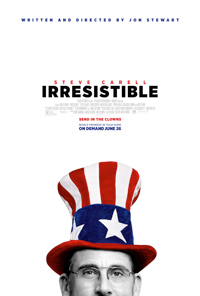Elephant Walk: Stewart Dulls the Sting of Political Campaigning Hypocrisy with Broad Satire
 The trick of a successful satire is to highlight stupidity or hypocrisy while walking the fine balance of presenting humor both provoking and morbidly comedic. There are a few examples of satirical perfection, with items like Orwell’s Animal Farm or Spike Lee’s Bamboozled (2000) grappling with complexities of its subjects while remaining intoxicating, unforgettable, and profound. Armando Iannucci, as well, has presented political and historical approximations of comedy in such insidiousness with In the Loop (2009) and The Death of Stalin (2017).
The trick of a successful satire is to highlight stupidity or hypocrisy while walking the fine balance of presenting humor both provoking and morbidly comedic. There are a few examples of satirical perfection, with items like Orwell’s Animal Farm or Spike Lee’s Bamboozled (2000) grappling with complexities of its subjects while remaining intoxicating, unforgettable, and profound. Armando Iannucci, as well, has presented political and historical approximations of comedy in such insidiousness with In the Loop (2009) and The Death of Stalin (2017).
Comedian and television host Jon Stewart returns once again to the director’s seat with his sophomore film Irresistible, an attempt to highlight the hypocrisy of political campaigning in the mutated two-party American political system which eschews such complexities for a broad demureness. Neither as smart or ribald as it should be, especially considering it arrives in one of the most important presidential election years in the United States, Stewart does get his points across in a comedic satire which sometimes hits upon the normalized insanity of contemporary politics, but only enough to suggest a much more potent critique lies mostly dormant beneath the weight of extraneous tangents.
What really seems to cripple Irresistible is its handling of Carell’s Gary Zimmer, a political consultant who, even when we’re supposed to believe has had his own personal epiphanies, is never any more enlightened about his own insincerity and formidable white privilege. It doesn’t help how Stewart’s script depends almost wholly upon the irony of refusing to redeem an irredeemable cog in the system, instead losing ground in Zimmer’s attraction and repulsion to Rose Byrne as his Republican nemesis, who are parallel images of one another.
Had this been teased out a bit more intelligently, Irresistible may indeed have showcased how the American political system is a two-faced mirror, an endless dichotomy of good and evil requiring the presence of one another to survive. But then, Stewart’s film depends on a third act twist to unveil its message to the masses, one which does reveal something profoundly complex about self-advocacy but really just plays like the logical conclusion of what Carell and Byrne’s characters represent, a party system which has little interest in what its constituents want or need. They are demi-gods or middle managers beholden to the upper echelon, their interests lying in who holds the purse strings rather than the collateral damage of the working class, the disenfranchised or the majority of American voices who remain invisible. True, the setting of rural Wisconsin allows Stewart to sidestep any in-depth discussions on racial disparity, sans an early sequence where Debra Messing makes a cameo as a campaign analyst whose white, liberal self-righteousness is playfully castigated. Black people are on the periphery, presented as extras in the film come voting day, and an awkward harangue about Carell screaming “Hispanics” hardly takes the place of addressing a point of contention absent from the film’s fabric.
Shot by Bobby Bukowski (a favorite of Oren Moverman) and with a whimsical score by Bryce Dessner, it’s a film whose blandness is compounded by unlikeable characters infiltrating a white, working class space. Mackenzie Davis and Chris Cooper feel underutilized, evoking the wronged denizens who would have been granted all the poignancy of a Jean Arthur or a Jimmy Stewart if this had been a Frank Capra picture (Jonathan Levine’s ribald Long Shot more beatifically charts this territory).
Byrne gets her share of laughs, though Stewart writes her character as a foul-mouthed oxymoron—the real gems are in the sidelines, including a wise-cracking Natasha Lyonne (think Rosalind Russell as a hacker) and an insanely genius cameo from Bill Irwin as a millionaire investor kept alive by machines, stomping into Carell’s campaign headquarters like a Stephen Hawking/Robocop hybrid. But Stewart uses too many broad choices. Even his repeated use of Bob Seger’s “Still the Same,” the refrain of which can be used to justify its inclusion, but like several other details, doesn’t quite fit upon closer examination.
★★½/☆☆☆☆☆


